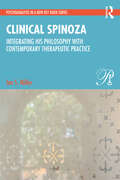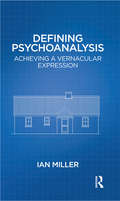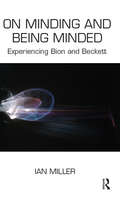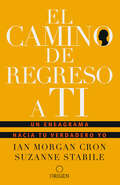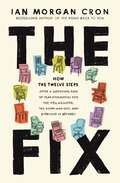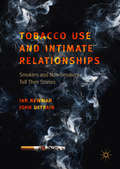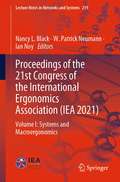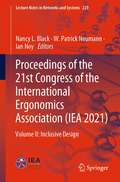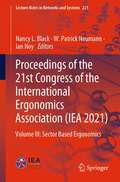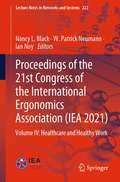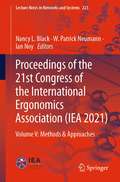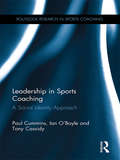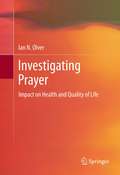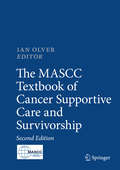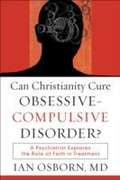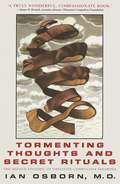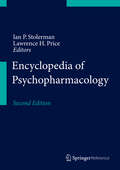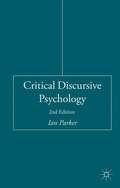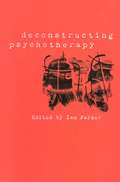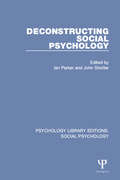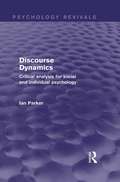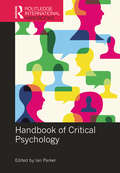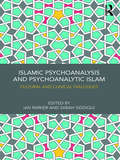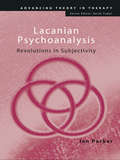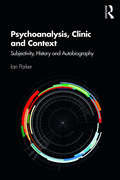- Table View
- List View
Clinical Spinoza: Integrating His Philosophy with Contemporary Therapeutic Practice (Psychoanalysis in a New Key Book Series)
by Ian MillerDiscovering Spinoza's early modern psychology some 35 years into his own clinical practice, Ian Miller now gives shape to this connection through a close reading of Spinoza's key philosophical ideas. With a rigorous and expansive analysis of Spinoza's Ethics in particular, Miller explores how Spinozan thought simultaneously empowered the original conceptual direction of psychoanalytic thinking, and anticipated the field's contemporary theoretical dimensions. Miller offers a detailed overview of the philosopher's psychoanalytic reception from the early work of German-langauge psychoanalytic thinkers, such as Freud and Lou Andreas-Salomé, forward into its Anglophone reception, influencing both mid-century humanistic American psychoanalysis as well as anticipating thinkers such as Bion and Winnicott. Covering key concepts in psychoanalytic theory and clinical practice, this book demonstrates how knowledge of Spinoza's philosophical work can help to both illulminate and improve modern psychoanalytic therapies.
Defining Psychoanalysis: Achieving a Vernacular Expression
by Ian MillerThe empirical baseline of today's psychoanalytic vernacular may be inferred from what psychoanalysts read. Contemporary information aggregation provides us with a unique moment in "reading" today's psychoanalytic vernacular. The PEP Archive compiles data on journal articles analogous to radio stations' "hit parades" of contemporary favorites. Defining Psychoanalysis: Achieving a Vernacular Expression provides a close reading of this contemporary assemblage, including three "strong" readings by Winnicott and two by Bion. It pursues the elements generated by these papers as an indication of contemporary psychoanalytic "common sense", our consensual building blocks of theory and practice.
On Minding and Being Minded: Experiencing Bion and Beckett
by Ian MillerOn Minding and Being Minded explores links between depictions of lived experience written by Samuel Beckett and the experience of psychoanalytic psychotherapy pioneered in the writings of W.R. Bion. These robust literary and clinical intersections are made explicit within the demanding culture of twenty-first century psychotherapy as patient demand for time-limited, result-driven therapeutic outcomes conflicts sharply with the contours of intensive, long-term psychotherapy. Bion and Beckett present elements of familiarity to the practicing psychoanalyst which emerge tantalizingly, out of explicit reach, yet become knowable through interpersonal engagement. These stutterings and intimations are thick with meaning, suggestively presented in passing. They hint at how it is for the patient, provoking excitations of thinking; and, like the mental constructions of us all, their articulation conceals deep artistry. On Minding and Being Minded provides a therapeutic link bridging the single session with multiple session psychotherapy focused upon the dynamic engagement of patient and therapist.
El camino de regreso a ti
by Suzanne Stabile Ian Morgan CronLa ignorancia es una bendición, excepto para el autoconocimiento. Lo que no conoces acerca de ti puede dañarte# a ti, a tus relaciones y a la forma en que vives la vida. Además, puede mantenerte en un plano superficial con Dios. ¿Quieres aprender a descubrir quién eres y por qué tropiezas una y otra vez con los mismos patrones autodestructivos? Encuentra la respuesta en el antiguo sistema de tipos de personalidad llamado Eneagrama, cuya asombrosa precisión para describir la personalidad que poseemos los seres humanos #tanto de forma positiva como negativa# ha elevado su popularidad en los últimos años. Aunque otros autores han explorado sus conexiones con la espiritualidad cristiana, no hubo anteriormente un enfoque tan práctico, exhaustivo y accesible de abordar como el que Ian Morgan y Suzanne Stabile han logrado. Al comenzar a efectuar los cambios que puedes empezar a hacer hoy mismo, la sabiduría del Eneagrama te ayudará a encaminarte hacia la senda que te conducirá a la mejor y más genuina versión de ti mismo. #Si quieres comprenderte a ti mismo y comprender a aquellos que te rodean, este libro profundo y brillante es un excelente punto de partida#.-#W. m. Paul Young, autor de La cabaña
The Fix: How the Twelve Steps Offer a Surprising Path of Transformation for the Well-Adjusted, the Down-and-Out, and Everyone In Between
by Ian Morgan CronDid you know that anyone--addicts or non-addicts--can benefit from working the Twelve Steps and find the freedom, joy, and intimacy with God that their hearts long for?We all suffer from a sense of spiritual homelessness--a feeling that we're not fully at home in the world. To cope with our painful feelings and life traumas, we search for quick "fixes" that eventually become habitual, self-destructive behaviors that ultimately create more problems than they solve.As a person in recovery from drug and alcohol addiction, Ian Cron is no stranger to these destructive habits. It wasn't until he embraced the Twelve Steps that he found true freedom. He knows from personal experience that Twelve Step recovery is more than just a life-saving strategy for guiding substance users into sobriety. Everybody is addicted to something to numb the discomfort of living in a messed-up world, he says, but the good news is that if you committedly "work the steps," you will eventually have a vital spiritual awakening that will give you an entirely new and radically beautiful orientation toward the life God has for you.If you long for sustainable healing and joy amid life's messiness, The Fix invites you to:Journey step-by-step through a spiritual curriculum that has helped millions overcome trauma, pain, and brokenness for over eight decadesUnderstand how the Twelve Steps can be a transformative tool not only for people with chemical or behavioral addictions but for anyone who wants to move beyond self-help to a spiritual awakeningCatch yourself in the act of self-sabotaging behaviors and understand how each day is a new opportunity to trade in self-willed reformation for grace-powered transformation "My original subtitle for this book--Twelve Steps to Unscrewing Your Screwed-Up Life--was a little over the top," Ian comments. "But anyone who has ever fallen for a quick fix (like drugs, alcohol, porn, overeating, work, religion, people-pleasing, and more) knows firsthand how our self-prescribed treatment plans derail us. They might not be as visible as empty bottles stashed inside a desk drawer, but they are just as life-complicating and soul-crushing."With his characteristic wit and transparent self-disclosure, Ian guides us in learning how to work each of the Twelve Steps so we will finally be given a "new pair of glasses" through which we will be able to see ourselves, others, and the world in a startlingly new way--and ultimately take hold of the freedom God has been waiting to give us all along.
Tobacco Use and Intimate Relationships: Smokers And Non-smokers Tell Their Stories
by Ian Newman John DeFrainThis book presents a wide variety of insights into the effects of smoking on both smokers and non-smokers. Based on extensive questionnaire surveys from across the USA, this research explores the complex dynamics of intimate relationships and how they are affected by smoking, especially with regard to honest communication. The volume delves into the battles which take place behind closed doors as both smokers and non-smokers invoke personal rights and argue their positions. Finally, the authors explore how health policy and public policy can better serve both smokers and non-smokers, and what the future may hold for the regulation of tobacco use.
Proceedings of the 21st Congress of the International Ergonomics Association: Volume I: Systems and Macroergonomics (Lecture Notes in Networks and Systems #219)
by Nancy L. Black W. Patrick Neumann Ian NoyThis book presents the proceedings of the 21st Congress of the International Ergonomics Association (IEA 2021), held online on June 13-18, 2021. By highlighting the latest theories and models, as well as cutting-edge technologies and applications, and by combining findings from a range of disciplines including engineering, design, robotics, healthcare, management, computer science, human biology and behavioral science, it provides researchers and practitioners alike with a comprehensive, timely guide on human factors and ergonomics. It also offers an excellent source of innovative ideas to stimulate future discussions and developments aimed at applying knowledge and techniques to optimize system performance, while at the same time promoting the health, safety and wellbeing of individuals. The proceedings include papers from researchers and practitioners, scientists and physicians, institutional leaders, managers and policy makers that contribute to constructing the Human Factors and Ergonomics approach across a variety of methodologies, domains and productive sectors. This volume includes papers addressing the following topics: Activity Theories for Work Analysis and Design (ATWAD), Organisation design and management (ODAM), Ergonomic Work Analysis and Training (EWAT), Systems HF/E, HF/E Education and Professional Certification Development.
Proceedings of the 21st Congress of the International Ergonomics Association: Volume II: Inclusive Design (Lecture Notes in Networks and Systems #220)
by Nancy L. Black W. Patrick Neumann Ian NoyThis book presents the proceedings of the 21st Congress of the International Ergonomics Association (IEA 2021), held online on June 13-18, 2021. By highlighting the latest theories and models, as well as cutting-edge technologies and applications, and by combining findings from a range of disciplines including engineering, design, robotics, healthcare, management, computer science, human biology and behavioral science, it provides researchers and practitioners alike with a comprehensive, timely guide on human factors and ergonomics. It also offers an excellent source of innovative ideas to stimulate future discussions and developments aimed at applying knowledge and techniques to optimize system performance, while at the same time promoting the health, safety and wellbeing of individuals. The proceedings include papers from researchers and practitioners, scientists and physicians, institutional leaders, managers and policy makers that contribute to constructing the Human Factors and Ergonomics approach across a variety of methodologies, domains and productive sectors. This volume includes papers addressing the following topics: Ergonomics in Design for All, Human Factors and Sustainable Development, Gender and Work, Slips Trips and Falls, Visual Ergonomics, Ergonomics for children and Educational Environments, Ageing and Work.
Proceedings of the 21st Congress of the International Ergonomics Association: Volume III: Sector Based Ergonomics (Lecture Notes in Networks and Systems #221)
by Nancy L. Black W. Patrick Neumann Ian NoyThis book presents the proceedings of the 21st Congress of the International Ergonomics Association (IEA 2021), held online on June 13-18, 2021. By highlighting the latest theories and models, as well as cutting-edge technologies and applications, and by combining findings from a range of disciplines including engineering, design, robotics, healthcare, management, computer science, human biology and behavioral science, it provides researchers and practitioners alike with a comprehensive, timely guide on human factors and ergonomics. It also offers an excellent source of innovative ideas to stimulate future discussions and developments aimed at applying knowledge and techniques to optimize system performance, while at the same time promoting the health, safety and wellbeing of individuals. The proceedings include papers from researchers and practitioners, scientists and physicians, institutional leaders, managers and policy makers that contribute to constructing the Human Factors and Ergonomics approach across a variety of methodologies, domains and productive sectors. This volume includes papers addressing the following topics: Transport Ergonomics and Human Factors, Practitioner Case Studies, Human Factors in Robotics, Manufacturing, Agriculture, HF/E in Supply Chain Design and Management, Aerospace, Building and Construction.
Proceedings of the 21st Congress of the International Ergonomics Association: Volume IV: Healthcare and Healthy Work (Lecture Notes in Networks and Systems #222)
by Nancy L. Black W. Patrick Neumann Ian NoyThis book presents the proceedings of the 21st Congress of the International Ergonomics Association (IEA 2021), held online on June 13-18, 2021. By highlighting the latest theories and models, as well as cutting-edge technologies and applications, and by combining findings from a range of disciplines including engineering, design, robotics, healthcare, management, computer science, human biology and behavioral science, it provides researchers and practitioners alike with a comprehensive, timely guide on human factors and ergonomics. It also offers an excellent source of innovative ideas to stimulate future discussions and developments aimed at applying knowledge and techniques to optimize system performance, while at the same time promoting the health, safety and wellbeing of individuals. The proceedings include papers from researchers and practitioners, scientists and physicians, institutional leaders, managers and policy makers that contribute to constructing the Human Factors and Ergonomics approach across a variety of methodologies, domains and productive sectors. This volume includes papers addressing the following topics: Healthcare Ergonomics, Health and Safety, Musculoskeletal Disorders, HF/E Contribution to cope with Covid-19.
Proceedings of the 21st Congress of the International Ergonomics Association: Volume V: Methods & Approaches (Lecture Notes in Networks and Systems #223)
by Nancy L. Black W. Patrick Neumann Ian NoyThis book presents the proceedings of the 21st Congress of the International Ergonomics Association (IEA 2021), held online on June 13-18, 2021. By highlighting the latest theories and models, as well as cutting-edge technologies and applications, and by combining findings from a range of disciplines including engineering, design, robotics, healthcare, management, computer science, human biology and behavioral science, it provides researchers and practitioners alike with a comprehensive, timely guide on human factors and ergonomics. It also offers an excellent source of innovative ideas to stimulate future discussions and developments aimed at applying knowledge and techniques to optimize system performance, while at the same time promoting the health, safety and wellbeing of individuals. The proceedings include papers from researchers and practitioners, scientists and physicians, institutional leaders, managers and policy makers that contribute to constructing the Human Factors and Ergonomics approach across a variety of methodologies, domains and productive sectors. This volume includes papers addressing the following topics: Working with Computer Systems, Human Modelling and Simulation, Neuroergonomics, Biomechanics, Affective Design, Anthropometry, Advanced Imaging.
Leadership in Sports Coaching: A Social Identity Approach (Routledge Research in Sports Coaching)
by Ian O'Boyle Tony Cassidy Paul CumminsThe professionalisation of sports coaching has demanded higher standards of leadership in order to improve performance and effectiveness. This book focuses on leadership in sports coaching, exploring key concepts and principles underpinned by a presentation of new empirical research. Placing social identity theory at its centre – a theory not previously applied to sports coaching – this book provides students and researchers with a powerful tool for understanding the complex social dynamic that is the coaching process. Its chapters cover all the central aspects of sports coaching, including leadership style, measuring effectiveness, motivation, confidence and team self-esteem. Chapters explore different coaching environments to investigate the extent to which social identity impacts on coaching and leadership. A ground-breaking contribution to this field of research, this book demonstrates the significance of social identity theory in sport for athletes, coaches and leaders. Leadership in Sports Coaching: A social identity approach is an illuminating read for any student or researcher with an interest in coaching theory, coaching practice, sport psychology, sport leadership or sport management.
Investigating Prayer
by Ian OlverThis book relates the experience of researching, planning, and conducting a scientific study into intercessory prayer (prayer for others). The purpose of the study was to ascertain whether the impact of prayer could be measured in a formal study, based on the large number of anecdotal reports of efficacy. The study was a prospectively randomized double-blind trial that added prayer by an established Christian prayer group to conventional therapy for cancer. The unique design feature was that the primary endpoint was a change in a validated scale of spiritual well-being. The patients were informed that they were participating in a study about spiritual well-being and quality of life but remained blinded to the intervention. The initial observation from the baseline data was that spiritual well-being made a unique contribution to quality of life. The final outcome of the study was that there was a statistically significant difference in spiritual well-being favoring the prayer group. The background includes a fascinating review of the medical literature on the topic, which contains positive and negative studies that each attracts a vigorous debate about methodology, endpoints, and whether metaphysical phenomena can or should be studied using scientific methodology. The complementary and alternative medicine literature is also equivocal as to whether prayer, arguably the most common complementary medical therapy, should be included in the range of interventions grouped under that heading. In addition to reporting the background and results of the study, the book explores the reactions of a range of individuals to the trial, all of which help reflect on the nature of prayer.
The MASCC Textbook of Cancer Supportive Care and Survivorship
by Ian OlverThis book is intended for medical students, residents, and fellows, as well as medical oncologists, radiation oncologists, surgeons, general practitioners, nurses and allied health workers. Complete with case vignettes, key points, and sidebar summaries to further assist readers using practical tips and tricks, this textbook provides current information on the management and prevention of cancer-related side effects, referring to up-to-date sources that are useful for conducting further research. It also introduces new topics, such as financial toxicity and complementary medicine, as well as covering the new side effects of targeted therapies not covered in the last edition. Additionally, MASCC Textbook of Cancer Supportive Care and Survivorship, 2nd edition assembles international, multidisciplinary experts who focus on a comprehensive range of symptoms and side effects associated with cancer and its treatment. Over the last five years, much progress has been made in supportive care, helping people cope with the symptoms of cancer and cancer treatment and addressing the physical and psychosocial matters of survivorship prior to, during, and after anticancer treatment. This is central to a patient’s wellbeing and the MASCC Textbook of Cancer Supportive Care and Survivorship, 2nd edition, explores not only the diagnosis and treatment, but also the increasingly recognized complex and ongoing symptoms experienced by long term cancer survivors. Significant advances have been made, designing strategies to manage the side effects and symptoms of treatment and to prevent them from occurring, maximizing the person’s ability to pursue daily activities.Reviews of the 1st edition: “This book reviews the management of cancer symptoms in patients and the side effects and late effects of treatment. The focus of the book is on supportive care and survivorship of cancer patients...The book covers symptomatology, medication and treatment, and system function of patients undergoing chemotherapy or radiation therapy...Photographs and algorithm charts further illustrate key points. This outstanding book is thorough in its explanations and easy to follow.” (Arlenda C. Thompson, Doody’s Review Service, January, 2011)
Can Christianity Cure Obsessive-compulsive Disorder?: A Psychiatrist Explores The Role Of Faith In Treatment
by Ian OsbornObsessive-compulsive disorder (OCD) is a relentless condition, the primary symptom being the occurrence of terrifying ideas, images, and urges that jump into a person's mind and return again and again, despite the individual's attempt to remove them. Christians who suffer from OCD may grapple with additional guilt, as the undesired thoughts are frequently of a spiritual nature. Yet people may be surprised to learn that some of the greatest leaders in Christian history also struggled with this malady. What did they experience? How did they cope? Were they able to overcome these tormenting, often violent, obsessions? Where did God fit into the picture? Ian Osborn shares the personal accounts of Martin Luther, John Bunyan, and Saint Thérèse of Lisieux, as well as his own story, in exploring how faith and science work together to address this complex issue.
Tormenting Thoughts and Secret Rituals: The Hidden Epidemic of Obsessive-Compulsive Disorder
by Ian OsbornObsessive-compulsive disorder has been called the "hidden epidemic": only a very few of the many people who have it reveal their condition. Ian Osborn is one of those who suffers from OCD, and his personal experience imbues this book with an exceptional clarity and understanding.Dr. Osborn discusses the various forms OCD takes and--using the most common focuses of obsession--presents detailed and dramatic cases whose objects are filth, harm, lust, and blasphemy. He explains how the disorder is currently diagnosed, and how it differs from addiction, worrying, and preoccupation. He summarizes the recent findings in the areas of brain biology, neuroimaging, and genetics that show OCD to be a distinct chemical disorder of the brain. He contrasts OCD with other "OCD spectrum disorders" such as anorexia nervosa and hairpulling, and he provides a historical overview that traces the development over the centuries of both behavior therapy and medications.
Encyclopedia of Psychopharmacology
by Ian P. Stolerman Lawrence H. PricePsychopharmacology is the study of the effects of psychoactive drugs on the functioning of the central nervous system at all levels of analysis, thus embracing cognition, behavior, psychological states, neurophysiology, neurochemistry, gene expression, and molecular biology. It includes, as an integral part of its domain, the interaction of environmental and genetic factors with psychoactive drug action, the medicinal and social uses of drugs, and the misuse and abuse of psychoactive substances. The aim of this comprehensive encyclopedia is to provide detailed information on psychopharmacology and its sub-disciplines, such as clinical psychopharmacology, molecular neuropsychopharmacology, behavioral pharmacology in laboratory animals, preclinical psychopharmacology, and human experimental psychopharmacology. The wide-ranging entries in the Encyclopedia of Psychopharmacology are written by leading experts drawn from a broad diversity of backgrounds and areas of specialization. The entries, comprehensive but succinct, provide basic and clinical scientists in academia, as well as industry, with the most important and relevant information on recent developments in psychopharmacology and its closely allied disciplines. The essential information about the field contained in these entries is readily accessible to clinicians, scholars, students, teachers, and interested laypeople.
Critical Discursive Psychology
by Ian ParkerCritical Discursive Psychology addresses issues in critical discursive research in psychology, and outlines the historical context in the discipline for the emergence of qualitative debates. Key critical theoretical resources are described and assessed and a series of polemics is staged that brings together writers who have helped shape critical work in psychology. It also sets out methodological steps for critical readings of texts and arguments for the role of psychoanalytic theory in qualitative research.
Deconstructing Psychotherapy (Perspectives On Psychotherapy Ser.)
by Ian Parker`I enjoyed this book, and think that it should find a grateful and attentive readership in the practical field as well as being a central text in academic settings. It will also be well received by those, like myself, for whom the interest is more in deconstructing than psychotherapy' - Dialogues This book takes the discursive and postmodern turn in psychotherapy a significant step forward and will be of interest to all those working in mental health who are concerned with challenges to oppression and processes of emancipation. It achieves this by: reflecting on the role of psychotherapy in contemporary culture; developing critiques of language in psychotherapy that unravel its claims to personal truth; and the reworking of a place in the transformative therapeutic practice. Deconstruction is brought to bear on the key conceptual and pragmatic issues that therapists and clinical psychologists face, and the project of therapy is opened up to critical attention and reconstruction. The book provides clear reviews of different viewpoints and will help readers to understand the complex terrain of debates.
Deconstructing Social Psychology (Psychology Library Editions: Social Psychology)
by Ian Parker John ShotterSince the early 1970s, social psychology has been in crisis. At the time Reconstructing Social Psychology (Armistead) provided a critical review of theories and assumptions in the discipline. Originally published in 1990, this title not only updates that review but illustrates the ways in which assumptions had changed at the time. The crisis is no longer seen as one which can be resolved within social psychology itself, but rather as one more deeply rooted in modern society. The contributors look at the issues raised by deconstruction in the other human sciences, as well as investigating the claims made by social psychology as a discipline. They examine the rhetoric and texts of social psychology, analysing how the texts which hold the discipline together obtain their power. The arguments include the political implications of deconstructive ideas, focusing on particular issues such as research, therapy and feminism. Deconstructing Social Psychology presents a strong selection of new critical writing in social psychology. It will still be a useful text for students of psychology, social science, and sociology, and for those working in the area of language.
Discourse Dynamics: Critical Analysis for Social and Individual Psychology (Psychology Revivals)
by Ian ParkerWhat are discourses? Are discourses ‘real’, and what is real outside language? In this book, originally published in 1992, Ian Parker provides one of the clearest and most systematic introductions to discourse research and the essential theoretical debates in the area. At the time it was one of the few texts to defend a realist position, discuss accounts of postmodernity and set out criteria for the identification of discourses. Discourse Dynamics is essential reading to anyone interested in project research and an understanding of the theoretical issues involved in discourse analysis. The book will also be of use to students other than those studying psychology. It addresses the concerns of all those looking at qualitative textual research in the human sciences and is still very much relevant today.
Handbook of Critical Psychology (Routledge International Handbooks)
by Ian ParkerChoice Recommended Read Critical psychology has developed over time from different standpoints, and in different cultural contexts, embracing a variety of perspectives. This cutting-edge and comprehensive handbook values and reflects this diversity of approaches to critical psychology today, providing a definitive state-of-the-art account of the field and an opening to the lines of argument that will take it forward in the years to come. The individual chapters by leading and emerging scholars plot the development of a critical perspective on different elements of the host discipline of psychology. The book begins by systematically addressing each separate specialist area of psychology, before going on to consider how aspects of critical psychology transcend the divisions that mark the discipline. The final part of the volume explores the variety of cultural and political standpoints that have made critical psychology such a vibrant contested terrain of debate. The Handbook of Critical Psychology represents a key resource for researchers and practitioners across all relevant disciplines. It will be of particular interest to students and researchers in psychology, psychosocial studies, sociology, social anthropology and cultural studies, and to discourse analysts of different traditions, including those in critical linguistics and political theory.
Islamic Psychoanalysis and Psychoanalytic Islam: Cultural and Clinical Dialogues
by Ian Parker Sabah SiddiquiThis pioneering volume brings together scholars and clinicians working at the intersection of Islam and psychoanalysis to explore both the connections that link these two traditions, as well as the tensions that exist between them. Uniting authors from a diverse range of traditions and perspectives, including Freudian, Jungian, Lacanian, Object-Relations, and Group-Analytic, the book creates a dialogue through which several key questions can be addressed. How can Islam be rendered amenable to psychoanalytic interpretation? What might an ‘Islamic psychoanalysis’ look like that accompanies and questions the forms of psychoanalysis that developed in the West? And what might a ‘psychoanalytic Islam’ look like that speaks for, and perhaps even transforms, the forms of truth that Islam produces? In an era of increasing Islamophobia in the West, this important book identifies areas where clinical practice can be informed by a deeper understanding of contemporary Islam, as well as what it means to be a Muslim today. It will appeal to trainees and practitioners of psychoanalysis and psychotherapy, as well as scholars interested in religion and Islamic studies.
Lacanian Psychoanalysis: Revolutions in Subjectivity (Advancing Theory in Therapy)
by Ian ParkerJacques Lacan's impact upon the theory and practice of psychoanalysis worldwide cannot be underestimated. Lacanian Psychoanalysis looks at the current debates surrounding Lacanian practice and explores its place within historical, social and political contexts. The book argues that Lacan’s elaboration of psychoanalytic theory is grounded in clinical practice and needs to be defined in relation to the four main traditions: psychiatry, psychology, psychotherapy and spirituality. As such topics of discussion include: the intersection between psychoanalysis and social transformation a new way through deadlocks of current Lacanian debate a new approach to ‘clinical structures’ of neurosis, perversion and psychosis Lacanian Psychoanalysis draws on Lacan's work to shed light on issues relevant to current therapeutic practice and as such it will be of great interest to students, trainees and practitioners of psychoanalysis, psychotherapy, counselling and other domains of personal and social change.
Psychoanalysis, Clinic and Context: Subjectivity, History and Autobiography
by Ian ParkerPsychoanalysis is a strange and mysterious practice. In his new book, Ian Parker offers insights into his own experiences, first as trainee then as analyst, the common assumptions about psychoanalysis which can be so misleading, as well as a map of the key debates in the field today. Beginning with his own history, at first avoiding psychoanalysis before training as a Lacanian, Parker moves on to explore the wider historical development of clinical practice, making an argument for the importance of language, culture and history in this process. The book offers commentary on the key schools of thought, and how they manifest in the practice of psychoanalysis in different regions around the world. Psychoanalysis, Clinic and Context will be of great value to practitioners and social theorists who want to know how psychoanalytic ideas play out in training and the clinic, for trainees and students of psychoanalysis or psychoanalytic psychotherapy, and for the general reader who wants to know what psychoanalysis is and how it works.
